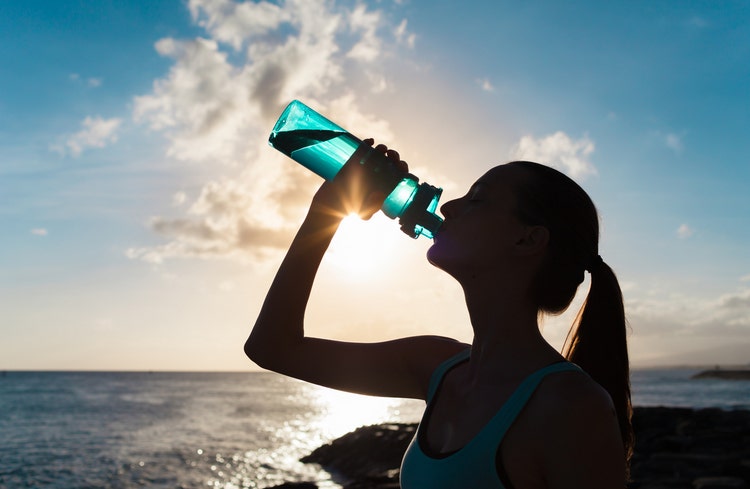Five Ways to Stay Hydrated
This Summer

Now that we’re finally kicking off summer, let’s talk about how to stay safe and healthy while you’re working up a sweat—even if it’s just lounging by the pool. The main way your body cools itself is through sweat. As sweat evaporates from your body, it takes some of the heat with it. Unfortunately, our body cannot store vast reserves of water or electrolytes. To keep up this cooling system, you must continue to consume water and electrolytes—or risk heat stroke and heat exhaustion.
Here are my top five tips for staying hydrated:
Tip 1: Ditch the 8-glasses-a-day rule
While you may have heard the eight-glasses-of-water-a-day rule, this is too generalized for most people. That number doesn’t take into consideration your diet, body weight or genetic predisposition or the temperature and humidity of your surroundings. Rather than blindly follow a specific number of glasses, I recommend that you listen to your body. Notice when you are thirsty or fatigued as these can be signs of mild dehydration. Also pay attention to the color of your urine. Your urine should be clear, not yellow or orange—a sign of dehydration.
Tip 2: Do a sweat test
If you’re an athlete, a sweat test is crucial to knowing whether you’re staying well-hydrated all summer long. While it may sound super scientific, it’s actually very easy to perform at home (or at your gym). Simply measure your weight immediately before and after your workout—naked. Subtract weight after exercise from your weight before. The difference is from what you lost in sweat. Drink two cups of water, enhanced with an electrolyte-rich powder for every pound you lost. Ideally drink this within a couple hours of finishing your workout.
Tip 3: Don’t waste water: add electrolytes
Together water and electrolytes paint a complete hydration picture. Being well hydrated keeps your blood at the right consistency and volume, allowing for efficient delivery of oxygen to muscles and removal of waste. Electrolytes play an important role as they are responsible for fluid regulation, muscle contraction, heart beats, and nerve function. Calcium, chloride, potassium, magnesium, and sodium are the main electrolytes that you can consume through food or an electrolyte-based beverage.
Tip 4: Sip consistently
I recommend sipping an electrolyte-rich beverage every 10 to 15 minutes during exercise, or more, depending on variables like heat and humidity, the intensity of your workout, and your personal physiology (some people simply sweat more than others). If you know you are an especially salty sweater (after a workout you can feel or even see gritty powder on your skin), make sure you are consuming more sodium than the average individual. I formulated Vega Sport Electrolyte Hydrator to ensure that it has a balance of all electrolytes—including sodium. It can be sipped mid-workout or throughout the day, since it has zero calories and sugar.
Tip 5: Eat your water
Eating a diet that is rich in whole, plant-based foods is also a good way to stay hydrated. Fresh fruits and vegetables not only provide water, but also essential electrolytes. Chew on these sources of water and electrolytes:
- Sodium – Sea salt, seaweed (kelp and dulse)
- Potassium – All fruits and vegetables
- Chloride – Celery, olives, seaweed (kelp, dulse, wakame), tomatoes
- Calcium – Blackstrap molasses, bok choy, broccoli, figs, green leafy vegetables
- Magnesium – Broccoli, buckwheat, celery, cucumber, kale, nuts, quinoa, seeds, spinach
To learn more about hydration for athletes, visit FuelYourBetter.com. There you’ll find nutrition and training strategies to address your training weakness head on—whether it’s hydration, muscle burn, overtraining, body composition or something else. You can also check out my latest article about plant-based proteins and building muscle in the May/June 2016 issue of 24Life.
Photo credit: Thinkstock, iStock kieferpics.